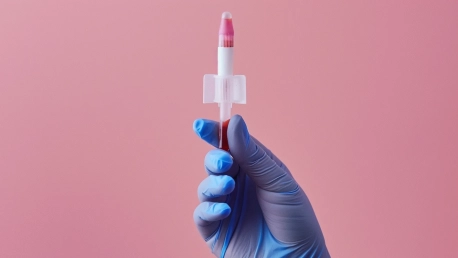Mistr, an innovative online telemedicine provider, is partnering with retail giant Walmart to pilot a groundbreaking initiative that aims to offer free at-home HIV testing kits in seven Walmart locations across Georgia. This collaboration aims to improve healthcare accessibility in regions with high HIV transmission rates. It also serves as a compelling example of the broader trend of leveraging retail spaces to provide critical healthcare services.
Expanding Healthcare in Retail Spaces
Bridging the Gap Between Online Services and Retail
Since its launch in 2018 by Tristan Schukraft, Mistr has significantly advanced telemedicine by making HIV preventive services like PrEP and DOXYPep, as well as long-term HIV care, available online. Despite its success as a direct-to-consumer brand, Mistr found that solely relying on online platforms limited its outreach potential. This realization led to the necessity of forming retail partnerships to better reach individuals who may not engage with online platforms like Meta, Instagram, or dating apps. The new partnership with Walmart is designed to address this gap, recognizing that retail chains such as CVS and Walgreens traditionally provide only sporadic testing days.By offering continuous, year-round access to HIV testing, Mistr and Walmart are adopting a proactive approach to healthcare delivery. The initiative starts with locations in Atlanta, Stockbridge, Morrow, Decatur, and Ellenwood in Georgia, demonstrating the untapped potential of retail environments in bridging healthcare accessibility gaps. With this collaboration, consumers can access crucial health interventions seamlessly within their local retail setting, making healthcare more approachable and reducing the stigma often associated with HIV testing.
Addressing High-Risk Areas
The selection of Georgia for this pilot program is strategic due to its high HIV transmission rates, marking the state as a priority area for federal efforts to eradicate the HIV epidemic. High-risk areas like Georgia are considered pivotal in the fight against HIV, making it an ideal location for this innovative program. The increased accessibility to HIV testing through this initiative is particularly important in regions that have historically been underserved by healthcare systems.The collaboration highlights the importance of continuously providing healthcare services in areas that require immediate intervention. Georgia’s status as a focal point for federal HIV reduction efforts underscores the necessity of targeted programs that can offer both preventive care and long-term treatment. By focusing on these high-risk areas, Mistr and Walmart aim to create a model that can be replicated in other parts of the country, potentially reaching a wider audience and contributing significantly to public health.
Operational Dynamics of the Pilot Program
Funding and Support Systems
A critical factor for the success of Mistr’s initiative is its comprehensive funding model, which ensures that a broad spectrum of individuals can access these essential services. About 70% of Mistr’s customers have insurance that typically covers preventative measures like PrEP or HIV treatment. For those without insurance or facing co-pay issues, Mistr collaborates with approximately 65 organizations nationwide to defray costs. This multi-faceted funding strategy aligns perfectly with federal efforts to end the HIV epidemic through exhaustive testing, prevention, and treatment programs. The community-based approach exemplifies how collaborative efforts can overcome financial barriers to healthcare access.Mistr’s linkage with various community benefit organizations ensures that even the most vulnerable populations are not left behind. This inclusive funding model plays a crucial role in guaranteeing that the service reaches as many people as possible, regardless of their financial situation. The promise of free at-home HIV test kits, backed by extensive community support, minimizes the deterrent of cost, encouraging more individuals to get tested and engage in preventive healthcare.
Leveraging Walmart’s Retail Footprint
Walmart’s extensive retail footprint provides unparalleled consumer visibility, thereby enhancing the ease with which people can access these life-saving services. While Mistr absorbs the costs related to test kits and their processing, Walmart facilitates the consumer outreach necessary for the initiative’s success. Once customers receive their testing kits at a Walmart location, they can send in their samples and subsequently access their results along with comprehensive information about preventive options like PrEP.Walmart’s commitment to offering these services free of charge highlights its dedication to improving healthcare accessibility. This pilot program demonstrates how retail environments can significantly enhance public health efforts by making essential services more accessible to the general population. The collaboration between Mistr and Walmart serves as a model that could potentially see expansion into more locations, furthering the reach and impact of at-home HIV testing.
Impact of the COVID-19 Pandemic on At-Home Testing
Changing Consumer Behavior
Consumer behavior regarding healthcare has transformed significantly due to the COVID-19 pandemic, normalizing the process of obtaining at-home medical tests. The frequent use of pharmacies or mail order for pandemic-related tests set a precedent, creating consumer expectations for convenience and efficiency. This shift in behavior perfectly aligns with the Mistr-Walmart initiative, offering a viable and convenient alternative to traditional healthcare appointments, which can often be lengthy and costly.Consumers now look for healthcare solutions that fit seamlessly into their daily lives, making at-home testing an appealing option. By tapping into this evolving consumer mindset, Mistr and Walmart are not only addressing an immediate healthcare need but also setting up a future-proof model for how healthcare can be delivered. This approach reduces barriers to testing and preventive care, encouraging more people to take proactive steps in managing their health.
Ensuring Patient Support and Understanding
Anarghya Vardhana from Maveron underscores the critical need for patients to understand their test results and subsequent treatments. Mistr addresses this by integrating video consultations with physicians for individuals testing negative, thus connecting them to preventive measures like PrEP. For those testing positive, Mistr ensures immediate access to a doctor and a patient care coordinator to guide them through treatment options and long-term care plans. This holistic approach guarantees that patients receive continuous support, transforming the testing process from a mere diagnostic tool to a comprehensive healthcare journey.The importance of accessibility to clinicians cannot be overstated. Understanding test results and having a clear treatment pathway is vital for individuals, especially those dealing with impactful diagnoses like HIV. Mistr’s model provides an excellent example of how telemedicine can complement at-home testing by ensuring that patients are not left navigating their healthcare journey alone. Such comprehensive care initiatives align perfectly with the broader goals of public health and help in building a more robust healthcare framework.
Strategic Implications and Future Prospects
Contributing to National HIV Reduction Goals
The federal government has set ambitious national goals to significantly reduce new HIV infections by 2030. Mistr’s services, particularly if successfully expanded through retail partnerships like the pilot with Walmart, could play a formidable role in achieving these targets. By providing easily accessible, free at-home HIV testing kits in high-risk areas, Mistr positions itself as a crucial player in the national efforts to curb HIV transmission. Success in the Georgia pilot could pave the way for further expansions, enhancing the accessibility of preventive healthcare measures on a wider scale.Mistr’s approach goes beyond treating HIV; it aims at preventing new infections, thus contributing to the long-term goal of eradicating the epidemic. The potential to expand into other retail locations nationwide offers a scalable solution that aligns with federal objectives. If other retail chains follow Walmart’s lead, this model could become a significant vector in the national HIV control strategy.
Challenges and Opportunities in Retail Healthcare Integration
Mistr, an innovative online telemedicine provider, has teamed up with retail behemoth Walmart to roll out a transformative initiative. This pilot program focuses on offering free at-home HIV testing kits at seven Walmart locations in Georgia. The primary objective is to enhance healthcare accessibility in areas that have particularly high rates of HIV transmission. This collaboration not only promises to expand access to essential health services but also exemplifies a growing trend to utilize retail environments as platforms for delivering critical healthcare solutions. By placing these testing kits in convenient retail locations, it becomes significantly easier for individuals to obtain vital healthcare resources without facing barriers like cost or travel. This initiative by Mistr and Walmart could serve as a model for future partnerships aimed at integrating healthcare services into everyday shopping experiences, thereby normalizing the process and promoting better health outcomes. It underscores a broader shift toward making health services more accessible and integrated into daily life.









